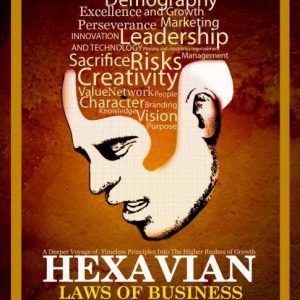Brief Introduction
Central Bank of Ideas is a smorgasbord of innovative business ideas. It is a 210 page book divided into three parts with a total of 13 chapters featuring everyday occurrences and challenges that we take for granted without knowing the business opportunities they hold down to blue ocean ideas that we either have not given a thought to or that we felt are not practicable in this clime.
…
PART ONE: THE UNEMPLOYMENT CRISIS
The author takes an in-depth analysis of the realities of graduate unemployment in Nigeria and the causes. He argues that the school has not always prepared the students well enough for the job market. He also argues that the school has lied and confused many people by giving them the impression that all those that graduated with good grades must get well-paying jobs. But according to the author this is not necessarily true. By saying this, the school automatically assumes that good grades are synonymous with competence. The school also assumed that the jobs are out there in unlimited number and all you need do is make good grades and yours will be given to you.
But the reality is that the available jobs are simply not enough to assimilate the increasing number of graduates being produced by our higher institutions. The reality is that by giving the impression that good grades guarantees good jobs, most students have decided to make those ‘acceptable grades’ by all means possible including through examination malpractices.
He drew important examples of graduates desperation in their pursuit of jobs to include the tragic Immigration recruitment exercise of 2014, the use of graduates as bus conductors across the nation, the use of PhD holders as truck drivers and many more other cases of graduates pleading for any position just in the name of job.
The author’s position is that it is very risky to send your children to school with the same advice of yesteryear; go to school, make good grades so that you can get secure and well-paying jobs. He opined that the student should be taught of the viable plan B which is that you either get a job or you create one.
…
PART TWO: WHERE DOES WEALTH COME FROM?
In part two the author argues that wealth resides in ideas. He emphasizes the fact that if one has idea then there is no limit to the height such a person can attend. He argues that every good thing currently enjoyed by humanity today was once someone’s idea.
Quoting directly from the book he said:
Traditionally, we think of and focus almost exclusively on wealth coming from natural resources such as soil, sun, water, oil, gas, minerals, and our forests, etc. This is not the complete picture. Wealth has other origins that are not obvious to medieval thinkers. If we look at Japan and Taiwan, we’d realize that wealth can be created where few natural resources exist. On the other hand, Nigeria and Angola are clear proof that a nation can be blessed with huge natural resources and yet wallow in penury. This is because wealth also resides in ideas and attitudes; wealth resides in knowledge, mindsets and belief system!
Faith and imagination are perhaps the most important capital goods in western economies and in any economy for that matter! Wealth is more a product of mind, faith, creativity, imagination and spirit than of resources. Economists that have studied the economic miracle of the USA found that families of zero wealth built the country to where and what it is today.
“Wealth comes from ideas, wealth comes from solving problems, and wealth comes from adding value to humanity.”
…
Facebook was an idea in the heart of one young man, Microsoft was an idea, Google was an idea, Tesla was an idea, Covenant University was an idea, Twitter was an idea, Uber was an idea, How They Started was an idea, SLOT Systems was an idea, Linda Ikeji Blog was an idea, and HTS Shuttle Services was also an idea. Today, each of them has created phenomenal wealth not just for the initial progenitors of those ideas, but for nations of the world. If you are looking for a way to create wealth for yourself and for others, you don’t need to look up, down or far, just think around you; there could just be an idea you have that can revolutionize the world. Remember that ideas have not stopped ruling the world.
He also stresses that problems are opportunities and since Nigeria is filled with all manner of problems it also means that opportunities are unlimited for the enterprising minds.
…
PART THREE: BANK OF IDEAS
Here is the crux of the book. The ideas featured in this book all come under this section and are grouped under:
- Blue Ocean Ideas
- Agricultural Sector
- E-commerce Sector
- Media, communication and Entertainment
- Financial Services
- Educational Sector
- Technological Sector
For each idea he provides insight into how it can be successfully executed and the market opportunities.
So if you are a businessman or woman looking for new opportunities, or you are an employee interested in having another stream of income or you are a graduate currently unemployed or not satisfied with the job you have, this book is certainly for you.
Central Bank of Ideas is a book by a Nigerian for Nigerians, it is written by an entrepreneur who has been on the streets of Nigeria and who has built multiple businesses from the scratch.




